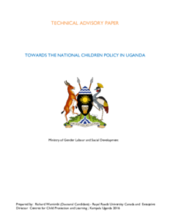INTRODUCTION
This technical advisory paper is prepared for the Ministry of Gender, Labour and Social Development to guide the scope of the National Children Policy expected to replace the existing National Policy on Orphans and Other Vulnerable Children in Uganda which has been in existence for past 12 years. In 2004, the Government of Uganda through the Ministry of Gender labour and Social Development developed the OVC policy whose goal is ensuring full development and realization of the rights of Orphans and other Vulnerable Children. The policy has two attendant National Strategic Programme Plan of Intervention for OVC i.e. 2004/2009 and 2011/2016 to support its implementation. While OVC targeted interventions were on going in line with the policy and attendant action plan, by 2010 a situation analysis on child vulnerability indicated that nearly 96% of Uganda’s children were vulnerable, of which 43% were moderately vulnerable and 8% critically vulnerable (Kalibala and Lyne 2010). This revelation requires for a complete review of the OVC policy to improve the quality of lives of children in a comprehensive manner. There are changing realities at the national, regional and global levels focusing on addressing the root causes of children's vulnerabilities, overall child well -being and violence against children that is not only specific to OVC but affects all children throughout out their life cycle. These and other emerging trends necessitate a complete review of the existing OVC policy to respond and improve the quality of life of the children in a comprehensive manner. Furthermore Uganda has several national policy frameworks that contribute and impact on the well being of children but they are fragmented and not adequately coordinated country wide and cannot adequately improve the quality of lives of the children. All these legal frameworks, policies and their attendant action plans will therefore require an overarching children policy to ensure a coordinated multispectral response to child wellbeing and improved quality of life.
This technical paper proposes key features and components of a comprehensive child Policy beyond the orphaned and vulnerable, highlighting the justification and need for coordinated processes in view of the existing national OVC policy at all levels. It further proposes critical parameters that need to be instituted to guarantee effective delivery of a comprehensive national policy on children. The paper provides comprehensive understanding, knowledge and evidence that is critical in informing policy and practice so as to promote effective and sustained action and child well being. This paper has been developed with the understanding that the pathway to “evidence-informed” policy and practice involves three active stages of progression, influenced by the policy context. The three stages are (1) sourcing the evidence, (2) using the evidence, and (3) implementing the evidence. A comprehensive desk review of key documents that aim at improving the lives of children in Uganda was conducted to explore the policy environment, understand key gaps and emerging issues and provide information and recommendations on the appropriate policy components and features for an overarching children policy. The process of developing this technical advisory paper involved input by stakeholders at a national dialogue held on 9th November 2016 in Kampala as a platform to reflect and work towards a comprehensive national children policy.
This paper is divided into three parts. Part I provides a policy context based on the international and national policy and legal frameworks aimed at improving the lives of children. Part II analyses and presents the key emerging issues, gaps and opportunities for programming and policy aimed at improving the well- being of children. Part III suggests the key components and features of a comprehensive children policy to guide interventions and programmes for children in the sustainable development agenda in Uganda.

